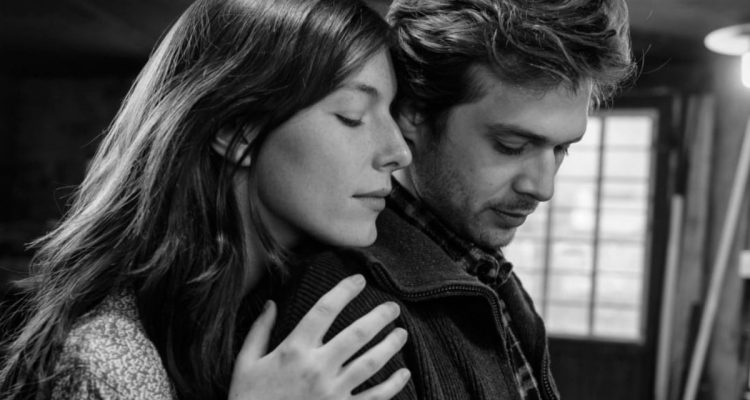They “meet cute” from across a street, at opposing bus stops; Luc (Logann Antuofermo) is going one way, Djemila (Oulaya Amamra) the other. We meet them in evenly composed medium-wide shots, the camera sharing the distance that separates them. Predictably, he trots across the street to ask for directions. And hey, wouldn’t ya know it? He’s going her way. The bus approaches, and he follows her on; as they ride, each one tries to look at the other without getting caught, and neither succeeds. When they get to his stop, she says, “I get off here too,” and maybe it’s true.
READ MORE: NYFF 2020: 12 Most Anticipated Films You Need See
In these, the first few minutes of Philippe Garrel’s “The Salt of Tears,” the French filmmaker captures the heart-stopping intensity of a new attraction, the possibilities and excitement that we might assume we’re in for a romance – this is how these two met, and let’s see what happens next. That’s where he begins to go, as Luc and Djemila decide to meet again later that day, but find the reunion awkward and strange; the silences are agonizing, and maybe this wasn’t a great idea after all. But soon they find a rhythm, and so does the film, dramatizing the carefree happiness of a new relationship, particularly when its participants are young enough that parents and roommates make private moments rare, and precious.
And then, something unexpected happens. In an unadorned and frankly uncinematic first fool-around session, Djemila decides they’re not, as we say, going all the way, and he’s incredulous (“Why not?” “Because, that’s all”). So he announces he’ll walk her home, and shortly thereafter, his ex-girlfriend Geneviève (Louise Chevillotte, from Garrel’s earlier “Lover for a Day”) arrives on the scene, and, well there are complications. They immediately fall back into old habits, and back into bed; the casual eroticism of their reunion is palpable, with none of the awkwardness of the failed encounter with Djemila.
READ MORE: 2020 Fall Film Preview: 40 Most Anticipated Films To Watch
Thus we have a story of two very different kinds of romance: the new but uncertain, and the comfortable but familiar. Luc initially tries to have it all, and in doing so, he blows it big; the efficiency, and heartlessness, with which he discards Djemila is difficult to watch. But things have a way of coming back around in this lifetime, and if he is unapologetic in his cheating, he’s setting himself up for the delicious payoff, later in the film, in which he believes he is being cheated on.
Garrel’s screenplay suffers from some aimlessness, and moments (a key one in particular) of predictability – but a film like this isn’t really about blowing our collective hair back with plot twists anyway. It’s about observation, of mood and detail, and it does both well (the eventual third-wheel, shared-space mechanics, including our old pal the tie on the door, are particularly well-placed). And he has all sorts of compelling dynamics happening on the fringes, chief among them a tender, tricky relationship between Luc and his father (André Wilms), who passed on the vocation of carpentry but pushed him to do something better: cabinet-making.
Amamra has a wonderfully tentative screen presence – you keep leaning forward to see what exactly she’s doing, but it all comes to a head in the scene in which she realizes what Luc is doing to her and that it’s over. Her work in that scene is crushing, and though Chevillotte may be cast as the spoiler, she gets an equivalent moment of her own, in which the pain in her face (in reaction to Luc’s callousness) reminds us that in a story like this, things are never black and white.
Though, as is Garrel’s custom, the movie itself is – crisp, gorgeous black and white (the cinematographer is the legendary Renato Berta, the filmmaker’s regular collaborator), all of a piece with the modesty of and intimacy of Garrel’s style. The dialogue, acting, and construction (the film is mostly comprised of short, direct scenes) are simple but never plain. In that approach, as well as the monochromatic photography, the filmmaker continues to pay homage to the French New Wave – and doubles-down with his love of the third-person omniscient narrator, sharing the stray thoughts of the flawed protagonist, and sometimes even making excuses for him.
So contrary to its opening passages, “The Salt of Tears” is not a boy-meets-girl story; it’s a boy-keeps-losing-girls story. It’s easy to dismiss him as a monster, but that’s too simple; he’s cavalier and insensitive, in that very specific, horny, mid-twenties way. Garrel puts us into his head without apologizing for him, treating him with empathy if not sympathy, which is hard to do. Not to make assumptions, but it’s the kind of story you probably have to have lived, at least a little, to tell this well. [B+]
Follow along with the rest of our 2020 New York Film Festival coverage here.

